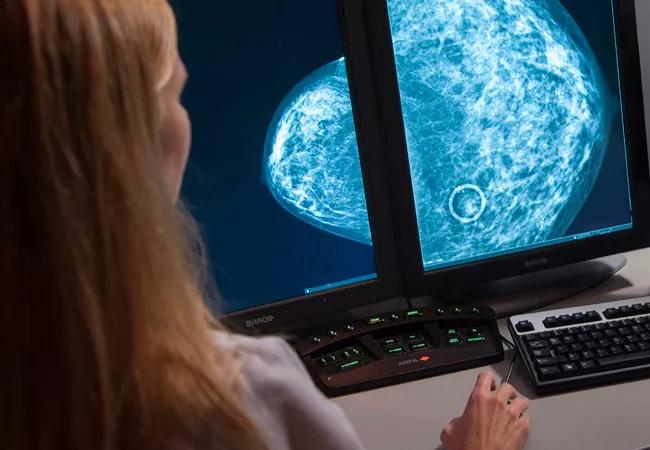Phase I study also reveals possible resistance mechanisms to HER2 antibodies

The antibody drug conjugate ado-trastuzumab emtansine (T-DM1) is the standard of care for second-line treatment of HER2-positive metastatic breast cancer, but even with this advanced therapy, survival rates are low.
Advertisement
Cleveland Clinic is a non-profit academic medical center. Advertising on our site helps support our mission. We do not endorse non-Cleveland Clinic products or services. Policy
Now, a recent trial of a combination therapy has yielded encouraging results for physicians looking for better treatment options.
The multicenter phase I clinical trial found that T-DM1 combined with neratinib, a tyrosine kinase inhibitor, resulted in an objective response in 63% of patients. The study also identified a clue to the mechanism behind anti-HER2 therapy resistance in some patients.
“We want to be able to move the needle and make treatment better for all patients,” says Cleveland Clinic Cancer Center oncologist Jame Abraham, MD, Chair of the Department of Hematology and Medical Oncology and the study’s principal investigator.
The findings were published in the Journal of Clinical Oncology. Results from a phase II clinical trial of the combination therapy conducted by Dr. Abraham and his collaborators are expected later in 2020.
About one-quarter of metastatic breast cancers are HER2-positive, a type that is especially aggressive and can metastasize quickly. For patients who receive T-DM1 as second-line treatment, the median time of progression-free survival is only 9 to 10 months.
Previous research had shown that treatment can be more effective using a dual HER2 blockade approach. “That’s the rationale of combining T-DM1 with another really active HER2 blocker like neratinib,” Dr. Abraham says.
Twenty-seven patients participated in the study, including 10 at Cleveland Clinic. All had a history of HER2-positive metastatic breast cancer and had previously been treated with trastuzumab, pertuzumab and taxane.
Advertisement
Participants received T-DM1 every three weeks and took neratinib daily at one of four dose levels. Since diarrhea is an expected side effect of neratinib, patients were treated with the antidiarrheal prophylaxis loperamide through the first cycle.
There were no unexpected toxicities. The most common side effect was diarrhea in the first treatment cycle. Six patients experienced grade 3 diarrhea and one experienced grade 3 nausea. No patient experienced grade 4 diarrhea, and there were no grade 5 toxicities.
Patients’ tumors were scanned and their size measured at regular intervals to assess response. Of 19 evaluable patients, 12 showed an objective response. Previous studies have found a response rate of 16% with T-DM1 in patients who progressed on prior treatment with pertuzumab and trastuzumab, Dr. Abraham says. “Compared to that, our response rate was actually pretty impressive,” he says, “It was higher than what we expected.”
While the FDA-approved dose for neratinib as a single agent is 240 mg, the study found that when combined with T-DM1, a dose of 160 mg had better results and fewer side effects.
The lower dose was recommended for a phase II trial, which was recently completed. Results are expected later in 2020.
In a separate finding, the study identified a possible connection between ERBB2 amplification and response to treatment. ERBB2 is amplified in in 20-30% of invasive breast carcinomas and promotes tumorigenesis and pathogenesis.
In the study, patients with cell-free DNA (cfDNA) ERBB2 amplification showed a deeper and more durable response than those without amplification. Six responding patients with cfDNA ERBB2 amplification had either a reduction in amplification (n = 1) or undetectable amplification (n = 5) early in the treatment cycle, indicating that molecular response in cfDNA may be an early predictor of clinical response.
Advertisement
Two patients with a high expression of total HER2 and p95HER2 achieved a complete response, with one remaining in full remission five years later.
The results highlight the potential benefits of analyzing cfDNA to personalize cancer treatment, the study notes.
The upcoming phase II trial results will provide a closer look at the connection between p95HER2 expression and therapeutic response.
Dr. Abraham says the current study demonstrates the need for more research to better understand the mechanism of treatment and resistance, and to identify new options for patients.
“Even with all the advancements, we’re still losing patients to metastatic breast cancer,” he says. “We need to find better treatments, and the only way we can do that is by doing more trials.”
Advertisement
Advertisement

Combining advanced imaging with targeted therapy in prostate cancer and neuroendocrine tumors

Early results show strong clinical benefit rates

The shifting role of cell therapy and steroids in the relapsed/refractory setting

Radiation therapy helped shrink hand nodules and improve functionality

Standard of care is linked to better outcomes, but disease recurrence and other risk factors often drive alternative approaches

Phase 1 study demonstrates immune response in three quarters of patients with triple-negative breast cancer

Multidisciplinary teams bring pathological and clinical expertise

Genetic variants exist irrespective of family history or other contributing factors